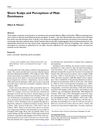Bald and Bad?
September 2019
in “
Experimental Psychology (formerly Zeitschrift für Experimentelle Psychologie)
”
TLDR Bald men are seen as less attractive without personal information, but this bias is automatic.
The study explored the perception of bald men in relation to the physical attractiveness stereotype (PAS), which suggests that "what is beautiful is good." It found that bald men were rated less socially attractive by same-aged women only when there was no individuating information about them. However, the PAS was consistently activated at an implicit level, as shown in experiments using the implicit association test and a source monitoring task. The research concluded that while individuating information about bald men could suppress the application of PAS, it did not prevent its activation.







